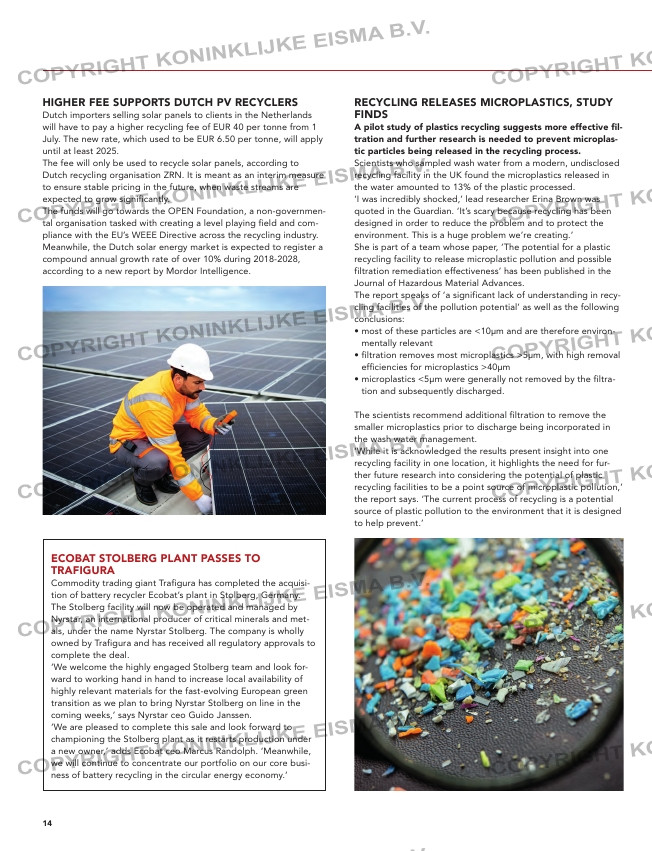Page 14 from: Recycling International – July/August issue 2023

14
ECOBAT STOLBERG PLANT PASSES TO
TRAFIGURA
Commodity trading giant Trafigura has completed the acquisi-
tion of battery recycler Ecobat’s plant in Stolberg, Germany.
The Stolberg facility will now be operated and managed by
Nyrstar, an international producer of critical minerals and met-
als, under the name Nyrstar Stolberg. The company is wholly
owned by Trafigura and has received all regulatory approvals to
complete the deal.
‘We welcome the highly engaged Stolberg team and look for-
ward to working hand in hand to increase local availability of
highly relevant materials for the fast-evolving European green
transition as we plan to bring Nyrstar Stolberg on line in the
coming weeks,’ says Nyrstar ceo Guido Janssen.
‘We are pleased to complete this sale and look forward to
championing the Stolberg plant as it restarts production under
a new owner,’ adds Ecobat ceo Marcus Randolph. ‘Meanwhile,
we will continue to concentrate our portfolio on our core busi-
ness of battery recycling in the circular energy economy.’
EMR TAKING SERIOUS STEPS TOWARDS FULL E-MOBILITY
UK metal recycler EMR has placed an order with JCB for 50 electric forklifts
to handle non-ferrous metals and end-of-life vehicles.
JCB says the deal is worth more
than £3 million (EUR 3.5 million)
and is its biggest UK order for
electric equipment. EMR recycles
over eight million tonnes of metals
and plastics each year and the new
JCB Teletruk models replace an
existing fleet of diesel models.
‘The switch to JCB electric
Teletruks is one of a number of
significant steps we have taken to
reduce the carbon intensity of our
business, on our journey to be carbon net-zero by 2040,’ says Giles Mogg, EMR’s
regional commercial manager. ‘They are fantastic, productive machines that will
make a positive difference to our fleet.’
The JCB 30-19E and 35-22E electric Teletruks are part of a new generation in the
JCB E-TECH range. The forward reach electric forklifts feature a unique telescopic
boom and are capable of an eight-hour shift on a single charge. A small turning
circle and single side-loading capability are claimed to make them more produc-
tive on materials handling work, both inside and outdoors.
The 35-22E has a max lift capacity of 3.50 tonnes and a maximum lift height of
4m. At 2m, lift capacity is 2.22 tonnes. The 30-19E model can lift up to three
tonnes with a maximum lift height of 4m. Lift capacity is 1.90 tonnes at 2m.
E-trucks to supply Tata Steel
Meanwhile in the Netherlands EMR has introduced electric trucks to carry scrap
from their yard in Amsterdam to nearby Tata Steel in IJmuiden. The e-truck has a
range of 300 km per charge. Thanks to the battery capacity of the new truck, it
can carry out four transports between EMR Amsterdam and Tata Steel without
having to recharge.
EMR aims to operate CO2 neutral by 2040 and around the world all company
cranes, forklifts and commercial vehicles will be electric.
HIGHER FEE SUPPORTS DUTCH PV RECYCLERS
Dutch importers selling solar panels to clients in the Netherlands
will have to pay a higher recycling fee of EUR 40 per tonne from 1
July. The new rate, which used to be EUR 6.50 per tonne, will apply
until at least 2025.
The fee will only be used to recycle solar panels, according to
Dutch recycling organisation ZRN. It is meant as an interim measure
to ensure stable pricing in the future, when waste streams are
expected to grow significantly.
The funds will go towards the OPEN Foundation, a non-governmen-
tal organisation tasked with creating a level playing field and com-
pliance with the EU’s WEEE Directive across the recycling industry.
Meanwhile, the Dutch solar energy market is expected to register a
compound annual growth rate of over 10% during 2018-2028,
according to a new report by Mordor Intelligence.
The NEW GENERATION of
XRF sorting machines for fine metals
4 mm -25 mm
NEW
Maximise your metal sorting efficiency
with the in-house sensor technology and
the new innovative belt system.
The secret to your success!
www.redwave.com
RECYCLING RELEASES MICROPLASTICS, STUDY
FINDS
A pilot study of plastics recycling suggests more effective fil-
tration and further research is needed to prevent microplas-
tic particles being released in the recycling process.
Scientists who sampled wash water from a modern, undisclosed
recycling facility in the UK found the microplastics released in
the water amounted to 13% of the plastic processed.
‘I was incredibly shocked,’ lead researcher Erina Brown was
quoted in the Guardian. ‘It’s scary because recycling has been
designed in order to reduce the problem and to protect the
environment. This is a huge problem we’re creating.’
She is part of a team whose paper, ‘The potential for a plastic
recycling facility to release microplastic pollution and possible
filtration remediation effectiveness’ has been published in the
Journal of Hazardous Material Advances.
The report speaks of ‘a significant lack of understanding in recy-
cling facilities of the pollution potential’ as well as the following
conclusions:
• most of these particles are <10µm and are therefore environ-
mentally relevant
• filtration removes most microplastics >5µm, with high removal
efficiencies for microplastics >40µm
• microplastics <5µm were generally not removed by the filtra-
tion and subsequently discharged.
The scientists recommend additional filtration to remove the
smaller microplastics prior to discharge being incorporated in
the wash water management.
‘While it is acknowledged the results present insight into one
recycling facility in one location, it highlights the need for fur-
ther future research into considering the potential of plastic
recycling facilities to be a point source of microplastic pollution,’
the report says. ‘The current process of recycling is a potential
source of plastic pollution to the environment that it is designed
to help prevent.’
10-11-12-13-14-15_trendsupdates.indd 14 05-07-2023 14:19



